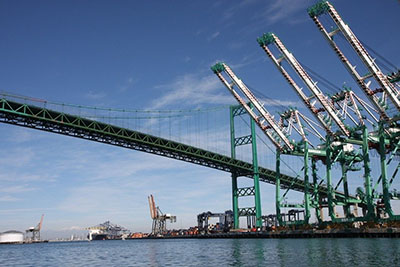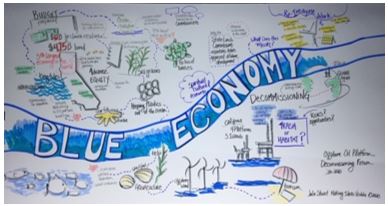You can also view this newsletter as a PDF.

State Lands Commission Builds on Strategic Plan
With Eyes Toward Forests and Coastlines
 In 1938, the California State Lands Commission (SLC) was created primarily as a resource trust manager for five million acres of state lands, from the Klamath River in the north, to the Tijuana Estuary in the south, from three miles off the Pacific Coast in the west, to Lake Tahoe in the east. This includes tidelands and California’s ports. The Commission enforces the protection of the public trust doctrine, state property rights, and important environmental quality and marine pollution prevention laws.
In 1938, the California State Lands Commission (SLC) was created primarily as a resource trust manager for five million acres of state lands, from the Klamath River in the north, to the Tijuana Estuary in the south, from three miles off the Pacific Coast in the west, to Lake Tahoe in the east. This includes tidelands and California’s ports. The Commission enforces the protection of the public trust doctrine, state property rights, and important environmental quality and marine pollution prevention laws.
Commissioners include the State Controller, Lieutenant Governor, and director of the Governor’s Department of Finance, with the State Controller serving as chair in even-numbered years.
Five years ago, Controller Yee led a stakeholder-driven process to adopt the first strategic plan in the Commission’s history. Ensuing efforts have reduced oil production in state waters and developed more collaborative working relationships with lessees and partner state agencies.
This year, under Yee’s leadership, SLC is reviewing that plan and delving into areas not fully considered five years ago, such as sea-level rise. Commissioners and staff are looking at the biggest challenges and top priorities for the next five years, as well as what needs to be expanded or eliminated from the original strategic plan.
In light of the state’s goal of reducing fossil fuel use, SLC will consider how to balance sustainable economic growth — including revenue generation for the state — with environmental protection of state lands through the lenses of equity and climate change. For example, much of state lands are forested lands. Commissioners will examine how SLC can better manage these lands given changing wildfire behavior. This new effort will require an implementation plan and close cooperation with other agencies.
There are oil wells off California’s coast that have not been in production in many, many years. When those leases were granted, there was no decommissioning plan that would cover the expense required to meet today’s environmental standards. Commissioners must consider how to proceed so costs do not fall to the state, as they have with recent oil-rig platform abandonments.
California’s port and harbor districts are critical coastal resources. They are essential to the national maritime industry and a catalyst for comprehensive economic and job growth in California. SLC has a track record of successfully partnering with ports to facilitate and promote responsible maritime commerce, navigation, trade, and waterfront revitalization consistent with the public trust doctrine.
For the last five years, SLC has worked with the Port of Los Angeles – the largest air polluter in the South Coast Air Basin – to identify ways to replace trucks, port equipment, and other sources of pollution. While progress has been made, SLC will continue to focus on ways to do better.
Public access to California’s coast and waterways remains a challenge. SLC coordinates with agencies like the California Coastal Commission on issues such as access. SLC played a critical role in achieving results at Hollister Ranch, where – after 38 years – state government finally is in the early stages of implementing a public access plan.
The basic questions for SLC this year are these: What else do we need to do, what are our goals, and what are the best strategies to adapt to the changes in front of us? Interested parties are encouraged to find the current strategic plan on the SLC website and join the discussion.
Ocean Protection Council Charts
Course for California’s Blue Economy
The California Ocean Protection Council (OPC) was created more than 15 years ago to help maintain heathy coastal and ocean ecosystems and the economies they support. Council members include the secretaries of the California Natural Resources Agency and the California Environmental Protection Agency, the chair of the State Lands Commission, one assemblymember, one state senator, and two public representatives.
The mission of OPC is to break down silos across government, ensure use of best available science, make recommendations to the governor and Legislature, and fund innovative projects. Current OPC priorities include climate change, marine protected areas, marine pollution, sustainable fisheries, water quality, and a sustainable ocean economy. OPC is developing a new strategic plan to provide direction on these and other issues for the next five years, likely to be finalized in February.
 California is home to one of the most diverse coastal and ocean ecosystems in the world and a marine economy valued at more than $44 billion a year. Climate change is causing a number of stressors up and down the coast from ocean acidification to sea-level rise. OPC proposes four directives to lead California’s ocean policy in the next five years:
California is home to one of the most diverse coastal and ocean ecosystems in the world and a marine economy valued at more than $44 billion a year. Climate change is causing a number of stressors up and down the coast from ocean acidification to sea-level rise. OPC proposes four directives to lead California’s ocean policy in the next five years:
- Safeguard coastal and marine ecosystems and communities in the face of climate change;
- Advance equity across ocean and coastal protection policies and actions;
- Enhance coastal and marine biodiversity; and
- Improve ocean health through a blue economy.
The last goal is newly defined for OPC to create powerful long-term solutions for an economy that spans tourism, recreation, commercial and recreational fishing, shipping, aquaculture, technology, and renewable energy.
The San Diego and Los Angeles regions are developing regional blue economy centers that can help develop a more nuanced California blue economy strategy that captures opportunities for responsible reliance on the ocean for food and energy while protecting ocean health. Each center has taken a different path.
AltaSea in Los Angeles has a grand vision based on academic relationships and key investment opportunities. The Maritime Alliance in San Diego has a blue tech focus and is working with other blue economy centers around the world. They have developed a strong education program for elementary school through master’s degrees and have identified employment opportunities for participants.
Controller Yee urges Californians concerned with the ocean environment and economy to join the discussion to strengthen OPC goals and to help advance ocean equity and the blue economy.